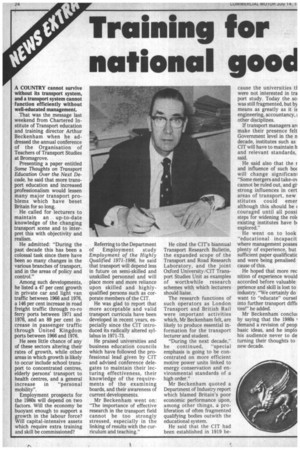Training for •
Page 26

If you've noticed an error in this article please click here to report it so we can fix it.
national good
A COUNTRY cannot survive without its transport system, and a transport system cannot function efficiently without well-educated management.
That was the message last weekend from Chartered Institute of Transport education and training director Arthur Beckenham when he addressed the annual conference of the Organisation of Teachers of Transport Studies at Bromsgrove.
Presenting a paper entitled Some Thoughts on Transport Education Over the Next Decade, he said that more transport education and increased professionalism would lessen many major transport problems which have beset Britain for so long.
He called for lecturers to maintain an up-to-date knowledge of the changing transport scene and to interpret this with objectivity and realism.
He admitted: "During the past decade this has been a colossal task since there have been so many changes in the various branches of transport, and in the areas of policy and control."
Among such developments, he listed a 47 per cent growth in private car and light van traffic between 1966 and 1976, a 146 per cent increase in road freight traffic through ro-ro ferry ports between 1971 and 1976, and an 89 per cent increase in passenger traffic through United Kingdom ports between 1966 and 1976.
He sees little chance of any of these sectors altering their rates of growth, while other areas in which growth is likely to occur include school transport to concentrated centres, elderly persons' transport to health centres, and a general increase in "personal mobility".
Employment prospects for the 1980s will depend on two factors. Will the economy be buoyant enough to support a growth in the labour force? Will capital-intensive assets which require extra training and skill be commissioned? Referring to the Department of Employment study Employment of the Highly Qualified 1971-1986, he said that transport will depend less in future on semi-skilled and unskilled personnel and will place more and more reliance upon skilled and highlyqualified persons such as corporate members of the CIT.
He was glad to report that more acceptable and valid transport curricula have been developed in recent years, especially since the CIT introduced its radically altered syllabus in 1971-73.
He praised universities and business education councils which have followed the professional lead given by CIT and advised conference delegates to maintain their lecturing effectiveness, their knowledge of the requirements of the examining boards, and their awareness of current developments.
Mr Beckenham went on: "The importance of effective research in the transport field cannot be too strongly stressed, especially in the linking of results with the curriculum and teaching." He cited the CIT's biannual Transport Research Bulletin, the expanded scope of the Transport and Road Research Laboratory, and the joint Oxford University/CIT Transport Studies Unit as examples of worthwhile research schemes with which lecturers should liaise.
The research functions of such operators as London Transport and British Rail were important activities which, Mr Beckenham felt, are likely to produce essential information for the transport lecturer and student.
"During the next decade," he continued, "special emphasis is going to be concentrated on more efficient motive power units linked to energy conservation and environmental standards of a high order."
Mr Beckenham quoted a Department of Industry report which blamed Britain's poor economic performance upon, among other things, a proliferation of often fragmented qualifying bodies outwith the educational system.
He said that the CIT had been established in 1919 be cause the universities ti were not interested in tra port study. Today the so was still fragmented, but b5; means as greatly as it is engineering, accountancy, other disciplines.
If transport managers an make their presence felt Government level in the n decade, institutes such as CIT will have to maintain h and relevant standards, said.
He said also that the r and influence of such boc will change significan1 "Some mergers and take-o' cannot be ruled out, and gi' strong influences in cert areas of transport, new stitutes could emer although this should be couraged until all possi steps for widening the rol( existing institutes have bl explored."
He went on to look "educational incapacit where management posses plenty of experience, but sufficient paper qualificatic and were being penalised cause of this.
He hoped that more rec nition of experience would accorded before valuable perience and skill is lost to industry. "We certainly do want to "educate" oursel into further transport diffi( ties!" he added.
Mr Beckenham conclu( by saying that the 1980s demand a revision of peop basic ideas, and he implo his audience never to de turning their thoughts to new decade.








































































































































